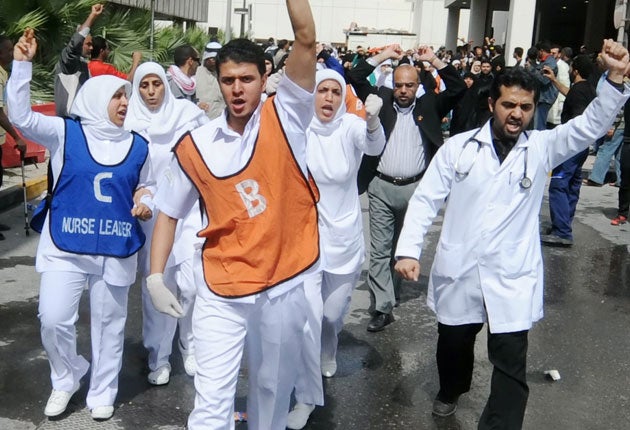Judge allows Bahraini medics to be examined for torture evidence

Your support helps us to tell the story
From reproductive rights to climate change to Big Tech, The Independent is on the ground when the story is developing. Whether it's investigating the financials of Elon Musk's pro-Trump PAC or producing our latest documentary, 'The A Word', which shines a light on the American women fighting for reproductive rights, we know how important it is to parse out the facts from the messaging.
At such a critical moment in US history, we need reporters on the ground. Your donation allows us to keep sending journalists to speak to both sides of the story.
The Independent is trusted by Americans across the entire political spectrum. And unlike many other quality news outlets, we choose not to lock Americans out of our reporting and analysis with paywalls. We believe quality journalism should be available to everyone, paid for by those who can afford it.
Your support makes all the difference.The mass trial of doctors and nurses accused of backing efforts to bring down the government of Bahrain was postponed yesterday amid claims of torture and brutality on the part of the country's security forces.
Thirty-four medical staff attended court out of 47 – 23 doctors and 24 nurses – who were charged with anti-state activities last month. It was not immediately clear why some were missing.
The doctors and nurses face allegations ranging from possessing weapons to harming the public by spreading false news and seeking to overthrow the ruling system in the strategic Gulf kingdom, which is home to the US Navy's 5th Fleet
But the trial was adjourned for a second time to 20 June after the chief judge at the special security tribunal accepted a request that the detainees should be medically examined to establish if they had been tortured. Lawyers for Bassim Dhaif, a consultant orthopedic surgeon, said he had been forced to stand for two weeks resulting in loss of sensation, swelling and discoloration of his feet and legs. Abdulla Al-Durazi, a trainee surgeon, had suffered a broken nose since the last court hearing and needed specialist medical care. Some had signed false confessions under threat and lawyers demanded they be re-investigated. When the accused attempted to describe the torture to the court the judge ordered them to be silent and had one doctor, Zahra Al-Sammak, a consultant anaesthetist, escorted from the court.
The detainees say their only "crime" was to treat injured protesters. Demonstrations led by Shia, who comprise 70 per cent of the population, started in February in protest at the discrimination they say they suffer at the hands of Bahrain's Sunni rulers. But the protests were crushed by the state and a campaign of intimidation began against the doctors and nurses. Protesters wounded were afraid to seek treatment and ambulances were blocked from going out to retrieve the injured, they said.
On Sunday, the security court sentenced a 20-year-old woman to a year in prison for reciting poetry critical of Bahrain's king.
Join our commenting forum
Join thought-provoking conversations, follow other Independent readers and see their replies
Comments